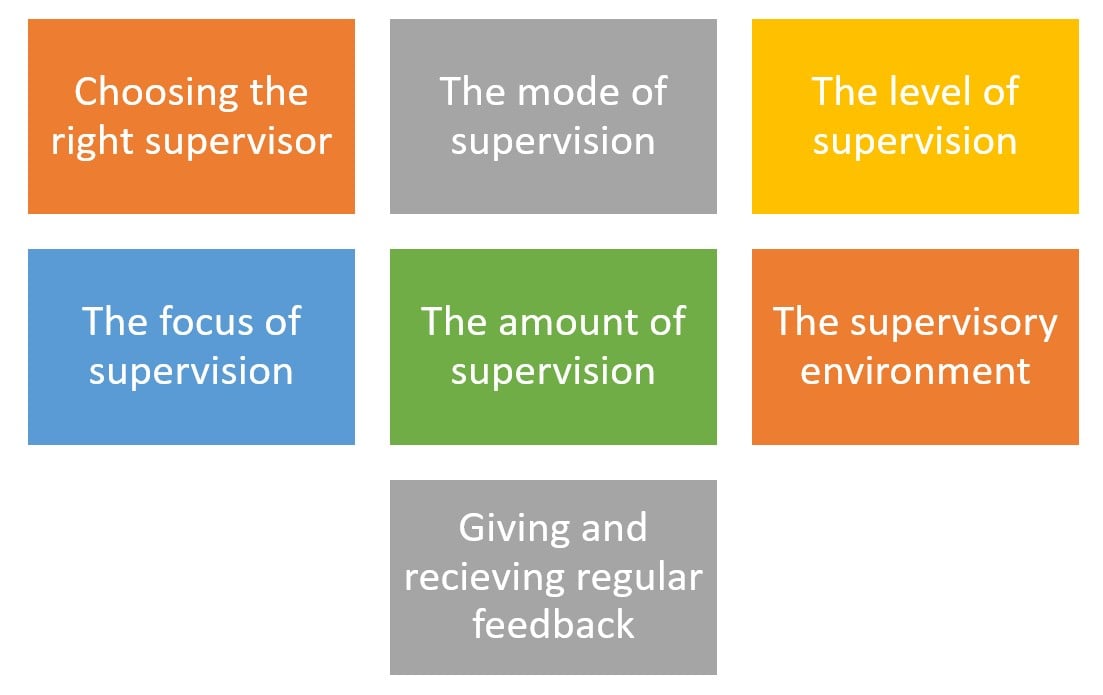
HCPC doesn’t have specific requirements for how to approach supervision. However, the guidance below sets out a number of factors that will help ensure your supervision is effective and meets your individual needs and expectations.
Establishing a supervision agreement between you and your supervisor, before commencing supervision, will also help make both your expectations and responsibilities clear. This is important for establishing a positive and supportive working relationship from the start.
We have developed a supervision agreement template, which sets out a list of factors that you could consider agreeing with your supervisor from the outset. Your professional body or employer may also have a supervision agreement or contract that you should use.
It’s also important that you plan each of your sessions, also help ensure your supervision remains focused. Our supervision recording template provides an example of how could structure your discussions, which you may wish to use.

Guidance for supervisees
-
Having the right supervisor who can help you to achieve your professional development goals is crucial to effective supervision. As important, is a positive, professional relationship based on mutual trust and respect between supervisee and supervisor.
Research suggests that supervision is most effective when supervisee’s can choose their own supervisor, to meet their learning objectives and cultural needs. However, it is recognised that this may not always be possible; you may be paired with a supervisor who you do not know but are able to build a positive, professional relationship with. It can take time for relationships to develop, but regular and protected time for your supervision can help facilitate this. Individuals will also typically not get to choose who undertakes their line management supervision.
Whoever your supervisor is, it’s important that your supervisor only supervises for areas within their scope of practice and that they have received appropriate training to support you.
Professional supervision should be clearly distinguished from managerial supervision, so it can be good practice to receive these types of supervision from different people. When this happens, both your professional and managerial supervisor will need to work together to ensure that there is an appropriate balance of each supervision type.
Cross-profession supervision
Supervisors can be in a different profession to the supervisee provided that they have the appropriate skills, knowledge and experience to conduct the supervision being requested, and have received appropriate training.
Supervisors may also be required at different stages of development, depending on your needs and the focus of the supervision. This means that your supervisor may change over time, or you may even choose to have multiple supervisors at once. When this happens, you should make sure that clear boundaries are set, so that your activities remain focused on the specific learning need. You should also keep accurate and clear records of your various activities, to use this as evidence for your CPD.
What to do if things go wrong
Maintaining a supportive, positive and professional relationship with your supervisor is an essential part to effective supervision. However, unfortunately things can at times go wrong and relationships can break down. This could be due to a clash of personalities, or because you are not receiving the level of supervision you need or expect.
When this happens, you should raise your concerns with your supervisor in the first instance to try and identify a solution to the problem between you. It might be that you decide an alternative supervisor is required.
If you do not feel comfortable speaking with your supervisor, or if you feel that this has not resolved your concerns, you should raise this with your manager and escalate as necessary, seeking advice from your trade union or professional body where appropriate. Your employer may also have an existing policy on what to do if you have concerns, which you should follow.
-
Supervision can often be thought of as one-to-one meetings. However, supervision can in fact take many different forms such as:
- One-to-one meetings;
- Peer supervision;
- Group supervision (such as with a peer group or with a facilitator);
- Ad hoc supervision or informal meetings; and
- Virtual / remote supervision.
You may even decide to undertake supervision through a combination of the above.
Each mode has different benefits, and there will be situations where certain modes will be more useful than others. For example, a benefit of group supervision is that it provides you with input from multiple peers, which can raise awareness of, and encourage, alternative interventions or actions.
However, if you have an additional learning objective, then one-to-one supervision may be more appropriate so that you receive more focused advice that’s personal to you and your learning objectives. One-to-one supervision might also be more appropriate for individuals requiring support with undertaking a new task that is beyond their current scope of practice.
Ultimately, it’s up to you to decide what type of supervision will be most effective for your practice. What works best will depend on a number of factors, including your experience, workload, your background and your learning objectives. The approach you take may also depend on what supervision is available to you in your place of work. If the options available to you are limited, you could also explore the possibility of accessing supervision external to your organisation.
What is important is that your supervision is regular and structured with a clear focus and set of objectives, and that the type of supervision is appropriate to meet these expectations. To achieve this, you should explore your supervision needs with your supervisor from the outset to identify the mode of supervision that will suit you.
Your employer or line manager will be able to help you determine the most appropriate type of supervision, according to your needs and objectives. Your professional body may also have further guidance to assist you.
-
When talking about the level of supervision, we mean the proximity your supervisor has to your practice. It’s important to remember that supervision is not about observing a person’s practice, which means that it does not necessarily have to take place in physical proximity.
Supervision can provide different levels of support, for example it can be:
- Direct, where a supervisor provides face to face guidance and support;
- Indirect, where a supervisor is readily available and within close proximity to provide support; or
- Remote, where a supervisor will be available for support, but will not directly oversee the tasks being undertaken. This may be undertaken through video conferencing or phone call.
What is appropriate will depend on the operational and clinical context that you are working in. It will also depend on whether you have the appropriate knowledge and skills to undertake activities independently.
Remote supervision may be appropriate or even necessary for those that work in less accessible locations, where direct or indirect supervision is not available. This can also be helpful when providing more pastoral support. However, if the supervision requires an observation of another’s practice, then either direct or indirect supervision would be more appropriate.
When participating in supervision, you will need to ensure that you get the right level of support to practise safely and effectively, and that any activity you undertake is within your scope of practice. It’s important that you work together with your supervisor to decide the level of supervision you will be receiving, so that you are confident with the arrangements put in place.
If you feel you are receiving insufficient support, you should raise this with your manager in the first instance and escalate as necessary, seeking advice from your trade union or professional body where appropriate. You can read more on how to raise concerns here.
-
Supervision can have multiple objectives. For example, supervisory activities may include:
- Structured discussions of your work including your clinical caseload
- Assistance with particular tasks or challenges
- Wellbeing checks
- Workload planning
- Debriefing discussions
Whatever the activity might be, supervision should be person centred and led by you. This means that the focus of supervision will vary for each professional, and will depend on factors such as experience, scope of practice and learning goals or objectives. Both you and your supervisor should have a shared understanding of the purpose of the activity and respective roles and responsibilities, so that expectations are met.
Supervision should also focus on sharing and enhancing knowledge, to support professional development and service delivery. To achieve this, it’s important that it is structured with a clear focus and set of goals to reflect on and evaluate against. Supervision is also about supporting you and your wellbeing. Your supervisor is there to support you and help you to overcome any barriers experienced, whether work related or personal.
To help focus your supervision activities, you should have a discussion with your supervisor from the outset, to discuss your specific aims and objectives. This can also help you evaluate and reflect on your progress, which can form an important part of your CPD.
You may also find it useful to look at our supervision recording template, which provides some suggestions for how you might want to structure and focus your supervision meetings.
Supervision provides a good opportunity to reflect on your practice, which can include specific patient case studies. When this happens, it’s important that you remember to maintain patient confidentiality which can be achieved by anonymising sensitive information that can identify individuals. More information about keeping information confidential and what we expect in this area can be found in our confidentiality guidance for registrants.
-
To be effective, it’s important that you get the right amount of supervision to practise safely and effectively, and to achieve your intended learning objectives. It’s also important that you prioritise these activities and engage proactively.
The HCPC don’t specify the amount of supervision you should receive as this will depend on your individual needs, and other factors such as your experience, working pattern and environment, and any employer policies and provision for supervision. More frequent supervision may also be required if you are newly qualified, or recently started a new role. Your professional body may also have further guidance or requirements for your profession, which you will be required to meet.
Supervision is most effective when offered regularly, such as weekly or fortnightly sessions. This is because regular supervision can help to develop good working relationships between you and your supervisor, which can in turn encourage more open and honest conversations, which will help with identifying opportunities for development. Setting aside protected time that suits both your work schedule and your supervisors will help ensure the regularity of your supervision.
However, flexibility is also important and you may need to develop new approaches to supervision to respond to operational demands or the needs of both participants. This might mean that your supervision takes place at different times of the day, to accommodate shift patterns and the demands of the service. This might also include adjusting the amount of supervision being received in response to any challenges experienced. If you are prevented from undertaking your supervision as planned, it’s important that you re-arrange the session to another more appropriate time.
Ad hoc or informal supervision, which can often occur outside of scheduled supervision sessions, is also an important part to effective supervision and should be provided in cases of need.
When participating in supervision, it’s important that you are open about your current experience and expectations, so that you and your supervisor can determine the amount of contact that is right for you. Your colleagues, manager and your professional body may also be able to help you identify the level of supervision that may be most suitable for you at any particular time.
-
Where your supervision takes place will depend on the focus of the activity. It may also depend on the options available to you in your place of work.
Wherever your supervision is held, having an open, honest and supportive environment, where you feel confident to reflect on your practice and discuss any concerns, is crucial. Having a supportive environment can also help to develop a more trusting and open relationship with your supervisor, which is important for identifying support needs more effectively.
Confidentiality
The ability to have confidential discussions is an essential part in ensuring effective supervision, as it helps ensure open and honest conversations, without the fear of reprisal. Having a private space to conduct your supervision so that your discussions can remain confidential is essential. If you are participating in supervision remotely, you should make sure that the systems you use are secure and that you are abiding by data protection requirements.
While confidentiality is important, there could be certain circumstances which require information to be shared. This could be when both parties have consented, such as when there is learning point that would be beneficial to share. However, there could also be instances where the consent of parties is not required. For example, if your supervisor has concerns about your wellbeing, or identifies a safeguarding concern. Confidentiality requirements should also be overridden if unethical or illegal practices come to light which might raise concerns about a person’s fitness to practise.
It’s therefore important that you and your supervisor have a shared understanding, from the outset, about confidentiality and when information might have to be shared. A good way to do this is by including this in the supervision agreement between you and your supervisor.
Our supervision agreement template provides a set of other factors that you could consider including, should you wish to establish one. If employed, your employer may have their own supervision agreement that you would be expected to use. Your professional body may also have examples or templates that you may wish to consider.
-
Constructive, regular and timely feedback is a key component to effective supervision, as it provides important material to enable you to reflect on your practice and develop professionally. When receiving supervision, it’s important that you are honest about development needs, and are open to make changes to your practice following any feedback received.
The importance of receiving and acting on feedback goes both ways. When participating in supervision, you should take the opportunity to regularly feedback to your supervisor, to help shape and modify their approach where necessary.
The notes that you take as part of your supervision can be used as evidence of your CPD at your renewal. You should therefore take a detailed and accurate record of your activities and feedback received, including detail of how you have put this into practice.
When including your supervision notes with your CPD, it’s important that you remember to maintain patient confidentiality. This can be achieved by anonymising sensitive information that can identify individuals. More information about keeping information confidential and what we expect in this area can be found in our confidentiality guidance for registrants.
While your supervision notes will provide important evidence of your CPD, you may wish to consider keeping an additional personal reflective log, which can be kept private. More information about reflective practice can be found on our website here.

